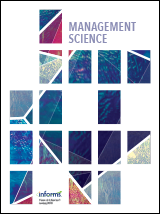Academic articles
Practitioner articles
Working papers
Books
Book chapters
Case studies
Other publications
Subject(s)
Economics, politics and business environment
Keyword(s)
model of sales, captives, shoppers, price dispersion, clearinghouse models
JEL Code(s)
D43, L11, M3
We generalize the captive-and-shopper model of sales to allow asymmetries in production costs and captive audiences in an oligopoly. Both kinds of asymmetry determine the firms that compete (via randomized sales) to serve the price-comparing shoppers, while other firms exploit their captive audiences. In contrast to a model with symmetric costs (but asymmetric captive audiences) there are natural situations in which more than two firms use sales by engaging in pairwise battles across different price intervals. We then study the choice of production technologies via costly process innovations. A distinctive asymmetry emerges endogenously: one firm innovates more and becomes the dominant supplier of shoppers. The pattern of innovations connects to the size of firms’ captive bases and the shape of technological opportunity. We also provide a trio of extensions to consider costly acquisitions of captives and shoppers, and captives’ choice of captor.
Copyright ©2025 by the American Economic Association.
Volume
45
Subject(s)
Economics, politics and business environment
Keyword(s)
Formalization, Tax Avoidance, VAT, Personal Income Tax
JEL Code(s)
O17, H26, H24, H25
ISSN (Online)
ISSN 1945-774X
ISSN (Print)
ISSN 1945-7731
Subject(s)
Economics, politics and business environment; Information technology and systems
Keyword(s)
data-driven quality improvements, externalities, co-opetition, data sharing
Large, generalist, technology firms—so-called “big-tech” firms—powerful in their primary market, routinely enter secondary markets consisting of specialist firms. Naturally, one might expect a specialist firm to be fiercely protective of its data as a way to maintain its market position in the secondary market. Counter to this intuition, we demonstrate that a specialist firm willingly shares its market data with an intruding generalist. We do so by developing a model of cross-market competition in which the data collected via consumer usage in one market can improve product quality in another. We show that a specialist firm shares its data to strategically create codependence between the two firms, thereby softening competition and transforming the generalist firm from a traditional competitor into a coopetitor. For the generalist intruder, data from the specialist firm substitute for its own investments in product quality in the secondary market. As such, the act of sharing data makes the generalist a stakeholder in the data collected by the specialist, and consequently in the specialist’s continued success. Moreover, although the firms benefit from data sharing, consumers can be worse off from weakened price competition and lower investments in innovation. Our results have managerial and policy implications, notably on account of backlash against data collection and the market power of big-tech firms.
© 2025, INFORMS
ISSN (Online)
1526-5501
ISSN (Print)
0025–1909
Subject(s)
Human resources management/organizational behavior
Keyword(s)
Culture, organizational culture, organizational structure and design, leadership styles
At the end of 2008, the founder and employees of MEG - an insurance brokerage firm active in the market since 2003 - were looking forward to a promising future. Having achieved sales of €33 million in 2007 and just short of €54 million in 2008, the company was aiming to hit the €100 million mark in the next financial year. Within a very short time, the firm founded by Mehmet E. Göker as “insurance specialists” had established itself as the second-most successful insurance broker in Germany. Its rapid rise to the top was thanks to a business model that consistently identified and supported customers interested in insurance products - and also thanks to a particular corporate culture at MEG.
Key teaching/learning objectives:
- Introduction to corporate culture
- What is a corporate culture?
- How to establish and change corporate culture?
- Introduction to corporate culture
- What is a corporate culture?
- How to establish and change corporate culture?
Subject(s)
Information technology and systems; Technology, R&D management
Keyword(s)
information technology, IT security law, cybersecurity, European regulation
Volume
52
Journal Pages
105927
ISSN (Online)
1873-6734
ISSN (Print)
0267-3649
Subject(s)
Economics, politics and business environment
Keyword(s)
digital identity, e-government, digital transformation
Subject(s)
Strategy and general management; Technology, R&D management
Keyword(s)
alliance termination; disintegration, innovation strategy, open innovation closure, relationship dissolution, tie dissolution
ISSN (Online)
2688-2639
ISSN (Print)
2688-2612
Subject(s)
Entrepreneurship; Management sciences, decision sciences and quantitative methods; Strategy and general management
Keyword(s)
entrepreneurial framing, audience heterogeneity, online platform, natural language processing (NLP)
Volume
47
Journal Pages
257–292
Subject(s)
Economics, politics and business environment; Ethics and social responsibility; Finance, accounting and corporate governance
Keyword(s)
ESG, GCC, corporate sustainability, stock returns, reverse causality
Volume
2
ISSN (Online)
2993-1282
Subject(s)
Human resources management/organizational behavior
Keyword(s)
executive education, change management, experiential exercise
@The Author(s) 2025
Journal Pages
1-12
ISSN (Online)
2379-2981

